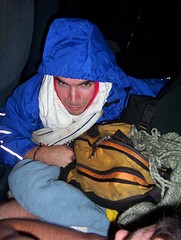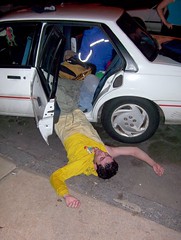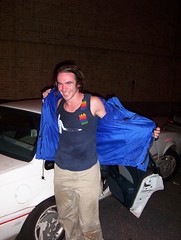How we did secure employment and extract its
unfailing lessons, and overcome perilous circumstances
by esprit rather than strength.

Divine law dictates that I will never be wealthy, nor ever be left stranded, starving, or alone in this universe. I will have just enough to complete my tasks and taxes, and maybe a dollar or so for a two-liter self-reward. The same easy equilibrium that is the liberty of the middle class: neither dependence nor privation.
The labs sent me home for an imbalance of bodily humors. Other gigs fell through. The only other path to solvency was through working promo at Six Flags America and entering a world unto itself, a world of endless lessons, caricatured sociology, and a 15-story Tower of Doom. One world, one themepark, neatly cleft into two sides: the public and its workers, both coming and colliding from very different angles. Thesis, antithesis, synthesis. Examined as a whole— the way shapes and policies are formed, the mandatory white shoes, the moods and commercial psychology— the amateur sociologist can’t help but derive some ideas from witnessing the Happiness Industry in action.
Terminologically, I adhere to the Craigslist distinction between a “gig” and a “job.” A gig is a temporary arrangement where the novelty and the job are over at roughly the same time. Gigs are the jobs of the future; a future in which people have come to their senses and want neither to serve nor be served. I want in my life, in lieu of a career, hundreds of ultimately meaningless gigs by which I can acquire hundreds of corresponding perspectives on the human world. I want to understand the bitterness of clerks, the chipperness of tollbooth operators, the tempo of parking lots, the shams of promo, the meaning of shrink wrap, the true lives and opinions of the butcher, the baker and candlestick maker. No station is without its secrets.
I also think the sharing rather than strict specialization of labor would be healthier for the body politic; creating more necessary slippage between the man and the office. Gigs hold this gap open. A gig, as opposed to a job, is labor with little regard for identity— unless dressing in a cartoon duck suit in any way meddles with your self-conception. Six Flags was a gig if ever there was one.
I rode the Tower of Doom five times in one break. On another, I stripped down to my swimming trunks and swirled around on the hypertube waterride you see in brochures— which topologically speaking, resembles an inside-out sphere. And, on top of it all, buffered my wallet at the relatively handsome rate (for me) of 14 dollars an hour.
What were the sacrifices? Inherent in working within the Happiness Industry, everyone knows, is surrendering yourself to “Toolness.” Toolness is that fallen state of being in which your every aspect— from the whiteness of your teeth to the whiteness of your sneakers— is put at the service of an external will. In this case, the will of Warner Brothers. You are a means rather than an end, in Kantian terms.
Toolness is always acute in Promotion, where even your hairstyle, your enthusiasm, and your perma-smile become property of Warner Brothers Incorporated. The cardinal sin, then, in promotion or marketing, is inner life. Betraying the mode of total exteriority. The horrific phoniness of realtors and television personalities and promo workers is no coincidence. Market forces mold and bake this special form of personality; a personality which has no space inside for concealment. It is not then the likability of this personality, but the failsafe compliance, the quality assurance, that guarantees its success in a sales career or retail environment. These were the people we worked with. They were tools. For them, it was a way of life.
We were also tools for the time being. The best coping mechanism for this situation is to run with the toolness, to overshoot the mark. To take the sales enthusiasm to such a pitch that it no longer seems credible, even to the point where it alienates the public with its empty horror. For example: screaming and punching the air for the chance to win a free Saturn Red Line. This was taking it exactly too far. We enjoyed it, though. The public enjoyed it. The Warner brothers, wherever they were hiding, had little veto over the matter.
The job description, especially from first appearances, was all cake and candy: we were sticking children inside of cartoons. Superimposing either their faces or their voices into the cartoon universe. This technological sorcery was accomplished either by green-screening or digital dubbing. Needless to say, we encouraged the worst in every child we encountered. “Worst” in the eyes of the Warner Brothers. One furtive thumbs-up, from us, and the Penguin would scream that Batman “sucks” over the loudspeaker. Black children, especially the ones too young to read the subtitles, poured forth dialogue of pure platinum. Two preschool geniuses— a brother and sister— kept us entertained for a good thirty minutes; narrating the cartoons, putting the microphones in their mouths, screaming unintelligibly. Others rapped. Some froze. But almost all of them reaffirmed the universal potential of the larval adult. Altogether, Six Flags was reaffirming. I have never seen more interracial families, for example. It was like a McDonald’s commercial. What product of factors caused this? Was it the park, Maryland, the classlessness— maybe Big Brother programs where privileged white adults could take underprivileged black and Hispanic children to amusement parks? It’s as if joy engenders justice— a thought-provoking possibility.
For the public, the themepark is something altogether different. It can be surrendered to as a funtopia; the visitor can surrender to its phantasmagoria, as W. Benjamin says, and walk away nourished. Imagine Martians seeing these giant machines, vortices, and vomit-comets built strictly for pleasure, rather than for the purposes of war. Earthlings building machines specifically for the illusion of Death. Business aside, Warner Brothers aside, something truly paradisiacal exists beyond the turnstiles. I remember evenings in Busch Gardens, with a crush on my friend Virginia and “the cold water flowing forth from the Lake of Memory,” where its mock-European thematics sent me into a sublime that Europe itself has never been able to match. Its mythos, supplemented by my own inner embellishments, became real and affecting. Its falsity was beside the point: it was simply three-dimensional fiction, equally capable of inducing hypothetical experience— though more in the soaring, nimbocumulous way of Romantic poetry. This is just to say: for the visitor, amusement parks can be valid, reaching forms of experience. Things are different on the worker side. Six Flags, I intuited, suffered from the same perversions that have made Disneyworld legend. Not least of all, was the offbalance sexual economics that tends to give rise to lust for the young. I’m not going to dig into names or particulars here. But as a rule, hot weather, salaried dude teamleaders with free hotel rooms, and teenage modeling agencies are a pretty combustible situation.
Whether repression comes from Catholic morality or office memo, the results are the same: an equal and opposite transgression. What demons would this breed in the Happiness Industry? With all the Mandatory Niceness, I worry that somewhere, the maintenance man on Foghorn’s Tinsel Town Train is having fantasies about eating children for dinner or dropping pianos on innocent animals. The relations between us and our coworkers was so strictly protocol that I’ll never know their true thoughts and character; whether or not they were harboring evil in their hearts.
The ride home had been soothing. On long rides, backseats often become dreamworlds; deep wells dominated both by daydreams and immediate plans. I had sunk into that world, gotten lost in the floorboards, when Rich and Dave first noticed the car’s thermometer glowing hot. Moments later, the car pulled over in a dust of expletives.
We were in a good humor, though, getting out of the vehicle. The world was evenly divided. Everything below the level of the streetlamps was a warm, unlonely yellow. Everything else, black sky. The juncture of highway and civilization has always charmed me. The sense of still motion, like a river. Such places— gas stations, truckstops, reststops, off-ramp plazas, hotels— always seem to offer an unearthly, Star Wars perspective on civilization. I don’t know.
When I see the beacon of bright-white gas stations, I think perfect oasis. I’ll always drive that extra mile of darkness, past the rinkydink tire alignment gas stations, for a hot-red Sheetz or Wawa with a proper mart and a wide, empty parking lot where I can sit and absorb the energies of cherry Coke and gasoline. There is, again, a certain hovering magic to these places, and to the place where we find ourselves currently stranded. Not a hundred paces from a Hampton Inn and a truly restful restroom.
Dave went and came back with coolant which, we discovered, did little but wet the asphault until we wheeled into the next station, a few miles away. Something was busted; something demanding immediate attention. We were quickly encircled by Good Samaritans. The gas station attendant. A local madwoman who was coughing up advice while muffling her dog. A kindly Canadian woman. And two Irishmen who, when not trying to fondle the kindly Canadian, were busy trying to be charming and telling us incorrect information that we swallowed on the authority of their accents. A hose was busted. In our infinite wisdom, we speculated that perhaps it was merely an “overflow valve.” The error of our thinking became apparent not even five minutes into our renewed attempt, when the dials went red again. We pulled over once more.
God had fucked us. 80 miles from Philadelphia, in a dead vehicle, with zero dollars and zero cents. What do other poor people do in these circumstances? It must happen often and, after a full day of happy-fun work, I could not help but surrender to a supreme laziness. I would have just as well slept beside the interstate, in the tall grasses. Rich’s father had given him, for a birthday or Christmas present, a Premium AAA membership. That magic card, it turned out, entitled the bearer to a hundred-mile free ride by towtruck. A miracle of excruciatingly minute details. Half of our problem evaporated. The other half was shipping us home. The AAA operator said the towtruck could carry two. This meant, by inference, that two of us would have to hide in the backseat of Heather’s car, as it was towed the remaining seventy miles back to Philadelphia. This maneuver could’ve cost Rich his gold card and the driver his license, but it was too Harpo Marx to pass over. Dave and I folded ourselves down into the backseats as Jen and Rich camouflaged us with bags and cases and random crap from Heather’s trunk. Seconds later, the man appeared, Rich kicked it in neutral, and before we knew it, we were riding in style. I was wrapped in a blue ski-jacket, beet red the whole ride and delirious with heat and muscle cramps. Terrified by the bumps and doubled suspension. An hour later, we arrived and unfolded onto the pavement outside the Athenaeum, to kiss the earth and praise the gods for the safe return to South Philadelphian reality.



